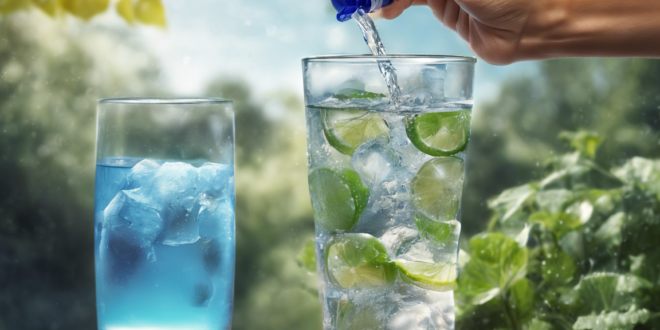Hydration Tips for Better Health: Quench Your Way to Optimal Wellness
Staying properly hydrated is more than just drinking water—it’s a fundamental pillar of overall health and well-being. In today’s fast-paced world, many Americans struggle to maintain adequate hydration, often overlooking its critical role in supporting bodily functions, mental performance, and long-term health. This comprehensive guide will explore essential hydration strategies that can transform your daily routine and boost your overall wellness.
Understanding Hydration: Why Water Matters
Water is the essence of life, comprising approximately 60% of the human body. Every cell, tissue, and organ depends on proper hydration to function optimally. From regulating body temperature to transporting nutrients and removing waste, water plays a crucial role in maintaining our physiological balance. Despite its importance, many individuals chronically underestimate their hydration needs.
Daily Hydration Requirements: Breaking Down the Basics
The traditional recommendation of eight 8-ounce glasses per day is a helpful starting point, but individual hydration needs vary based on multiple factors. Age, weight, activity level, climate, and overall health contribute to determining optimal daily water intake. Athletes, outdoor workers, and individuals living in hot or humid environments may require significantly more fluid consumption.
Signs of Dehydration: Recognizing Your Body’s Warning Signals
Dehydration isn’t always obvious. Subtle signs include:
• Persistent fatigue
• Decreased cognitive function
• Dry skin and lips
• Headaches
• Dark-colored urine
• Reduced urination frequency
By understanding these indicators, you can proactively address your body’s hydration needs before more serious complications arise.
Strategic Hydration Techniques for Optimal Health
1. Morning Hydration Ritual
Start your day with 16-20 ounces of water immediately upon waking. This practice helps rehydrate your body after sleep, kickstarts metabolism, and promotes better digestion.
2. Technology-Assisted Tracking
Leverage smartphone apps and smart water bottles that monitor your daily intake, sending timely reminders to drink water and tracking your hydration progress.
3. Electrolyte Balance
Plain water isn’t always enough. Consider incorporating electrolyte-rich beverages or natural sources like coconut water, especially after intense physical activity or during illness.
Hydration Beyond Water: Diverse Fluid Sources
While water remains the gold standard, other beverages and water-rich foods contribute to your daily fluid intake. Herbal teas, fresh fruits, vegetables, and broths can supplement your hydration strategy. Watermelon, cucumber, and strawberries are particularly excellent hydrating foods.
Hydration and Exercise: A Critical Connection
Physical activity increases fluid loss through sweat, making proper hydration crucial for athletes and fitness enthusiasts. Develop a personalized hydration plan that accounts for:
• Pre-workout fluid intake
• During-exercise hydration
• Post-exercise replenishment
Environmental Considerations: Adapting Your Hydration Strategy
Different environments demand different hydration approaches. High-altitude locations, extreme temperatures, and low-humidity regions require more sophisticated hydration strategies. Consider using a hydroflask or insulated water bottle to maintain optimal water temperature and accessibility.
Addressing Common Hydration Myths
Myth: You should only drink when you feel thirsty.
Reality: Thirst is a late-stage indicator of dehydration. Consistent, proactive hydration is key.
Myth: Coffee and tea dehydrate you.
Reality: While caffeine has mild diuretic effects, these beverages still contribute to overall fluid intake.
Special Population Hydration Considerations
Different life stages and health conditions require tailored hydration approaches:
• Pregnant women
• Elderly individuals
• Children and adolescents
• Individuals with chronic health conditions
Consulting healthcare professionals can help develop personalized hydration strategies.
Technological Innovations in Hydration Monitoring
Emerging technologies like smart wearables and advanced hydration sensors are revolutionizing how we track and manage fluid intake. These innovations provide real-time insights into individual hydration status, enabling more precise and personalized approaches.
Conclusion: Embracing a Hydration-Conscious Lifestyle
Optimal hydration is a holistic lifestyle choice, not a temporary intervention. By understanding your body’s unique requirements and implementing strategic hydration techniques, you can enhance physical performance, cognitive function, and overall well-being.
Remember, consistent, mindful hydration is your pathway to improved health. Start your journey today by making water your primary ally in wellness.
 Good Calories Guide GoodCalories Guide focuses on nutrition, healthy eating, and overall wellness. The site offers practical insights into evidence-based dietary practices, including tips for specific lifestyles such as veganism, keto, and family-friendly meal planning. It also addresses unique nutritional needs for individuals with conditions like diabetes or food allergies, while providing quick and accessible recipes to make healthy living a sustainable and enjoyable choice.
Good Calories Guide GoodCalories Guide focuses on nutrition, healthy eating, and overall wellness. The site offers practical insights into evidence-based dietary practices, including tips for specific lifestyles such as veganism, keto, and family-friendly meal planning. It also addresses unique nutritional needs for individuals with conditions like diabetes or food allergies, while providing quick and accessible recipes to make healthy living a sustainable and enjoyable choice.


